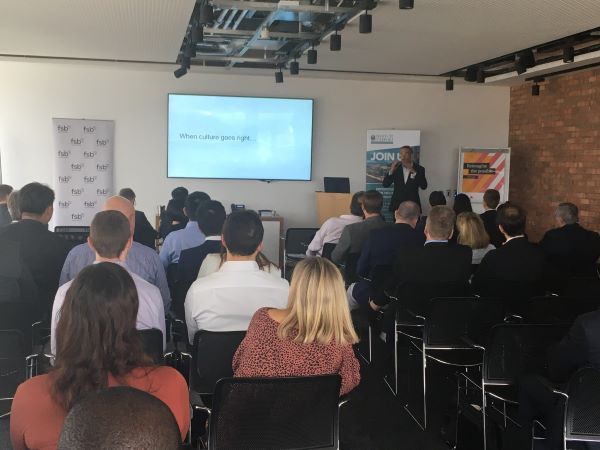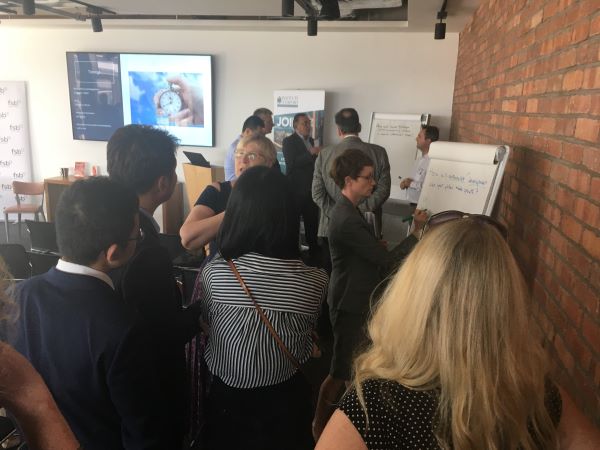
The latest regional World Trade Summit in Bristol proved to be one of our most interactive and engaging events in recent memory. Hosted by PWC on July 3rd, the summit focused on opportunities and challenges in markets ‘beyond the EU’ and featured an interactive workshop session run in partnership with the Federation of Small Businesses.
With the first ever World Trade Summit taking place in the South West three years ago, Linda Middleton-Jones, our Director of Membership for the region, was on hand to set the scene as the day’s facilitator. Following introductory remarks from PWC’s Richard Partington, Linda, who is also the Chair of our Academic Board, gave an overview of the challenges UK exporters are set to face in the years to come.
She noted, however, that exporting can be easily done as long as businesses take the time to learn how it’s done – or at least contact someone who can help them with it. She outlined how the training courses and qualifications provided by the Institute of Export & International Trade equip business and individuals with the skills and knowledge needed to thrive internationally.
Opportunities Beyond the EU
We were then delighted to hear from three market specialists about where many of the opportunities beyond the EU will lie for our exporters. Ajay Sethi, President at ASA & Associates, presented on the India market and noted that significant growth in the Indian middle class is opening a massive new consumer base for businesses in the UK. He noted that key reforms are being undertaken to improve the ease of doing business there, including the recently introduced Goods and Services Tax, Insolvency and Bankruptcy Act, and the Real Estate Regulatory Act. On a cautionary note, he advised delegates that India should not be treated as a single market, but as multiple regions.
This advice was also applied to the China and ASEAN markets by Jamie Shaw (China Market Business Advisor – China Britain Business Council) and Paul North (ASEAN Trade Adviser – UK ASEAN Business Council). Jamie noted how businesses need to break China down into several markets, noting that there are over 160 cities in the country with a population of over a million. He noted that China is still experiencing huge growth compared to other developed nations and that a rebalancing of its economy is creating a consumer base with an increasing interest in premium goods and services. However, he advised that the ‘Made in the UK’ brand only goes so far there, noting that businesses need to be selling genuine high-quality offerings given the increasingly competitive marketplace there.
Paul North noted that the ASEAN region is the fastest growing economic area in the world and is due to go from 6th to 4th in the world’s top performing regions within 10 years – behind only China, the USA and the EU. He gave an overview of the support on offer for businesses looking to enter ASEAN markets, including the in-market offices of bilateral chambers of commerce.
Global Britain needs to up it’s game
Selecting a market to export to is all well and good, but businesses still need to know what it takes to be successful there. One area where UK business are falling short is cultural awareness, according to Neil Payne from Commisceo Global.
Neil pointed out that the UK is glued to the bottom of the international table for language skills and noted that a culture shift within the UK is needed before its businesses can truly succeed overseas. He argued that businesses need to ensure that they are taking the efforts needed to understand the cultures they’re selling to. Businesses that fail to do this will end up losing face and losing customers.
Brexit and the bigger picture when it comes to the pound
Daniel Ashley, FX Dealer at Bibby Foreign Exchange Limited, also gave an important insight into the conditions that cause currency fluctuations – which in turn can hit the profits of exporters, unless appropriate measures are taken. While he noted Brexit’s significant impact on the value of the pound, he was also keen to note other factors that can influence currency valuations, including President Trump’s Twitter account. He added that the recently disrupted geopolitical landscape has become a more important consideration in the currency exchange world, which had previously been more focused on economic data and research findings.
Dan concluded by pointing out some of the measures exporters can take to mitigate currency risk, including forward contracts.
Having a plan is key – for both large and small exporters
The morning summit concluded with a case study panel chaired by our Senior Content Editor, William Barns-Graham. Susie Dorman, from recent Open to Export competition winners One & Eight, who produce porcelain jewellery and giftware products, spoke of the importance of having and sticking to an export plan. As an SME, she noted that using Open to Export’s online planning tool helped her to comprehend all the disparate factors that go into market selection, allowing her to focus on the US and European markets.
She was followed by Ben Goodare from Renishaw plc, who spoke of the importance of communication and internal training in enabling his company’s global team to stay on the same page when it comes to its trade and compliance functions. He spoke with particular reference to the varying export control regulations around the world.
Afternoon ‘International Trade Assembly’ provides space for thought and feedback
After the World Trade Summit had ran its usual format in the morning, Linda Middleton-Jones returned to facilitate an interactive workshop session in the afternoon in which delegates discussed 4 different key discussion points in global trade. Described as an ‘International Trade Assembly’, the interactive session was run in partnership with the Federation of Small Businesses and was framed as an opportunity for delegates to feed back to the IOE&IT about what support they need in the future as they begin to face the big questions of tomorrow.

The session focused on 4 questions:
- How will modern technologies (including blockchain) influence and develop international trade?
- How will sustainable development rules impact global trade growth?
- What areas of international trade support do you find most effective and which areas need improvement - where are the gaps?
- UK in 2025 – Trade Agreements, Regulations and international business – what does it look like?
The discussions were lively and informative, and we look forward to sharing some of the findings from them in due course.
Engaged and ready for whatever comes next
The 2019 South West Trade Summit was one of our liveliest and most attended regional events yet, suggesting that businesses in the region remain enthusiastic about the opportunities global trade presents and are ready to engage with the challenges it will put to them.
Whatever happens with Brexit, the engagement with exporting on show here suggests that there are plenty of reasons to remain optimistic about the prospects of the businesses in the region.



